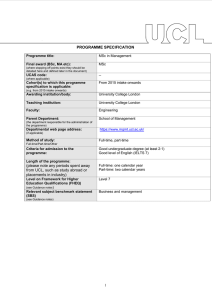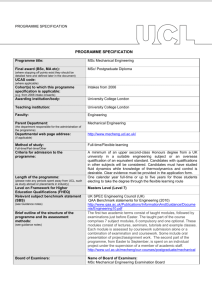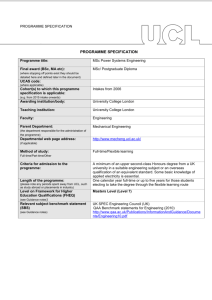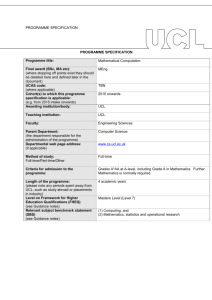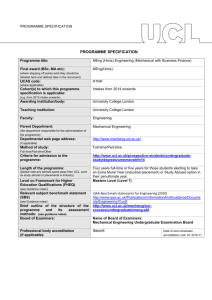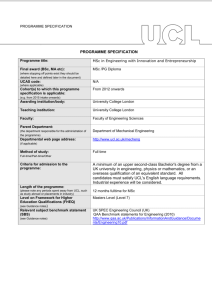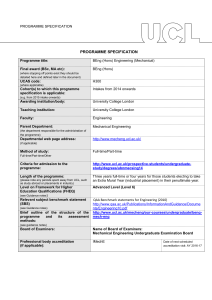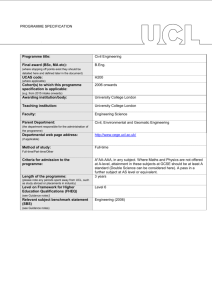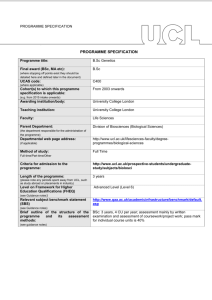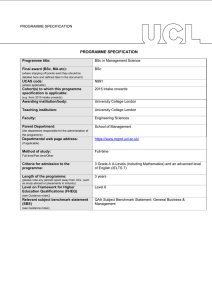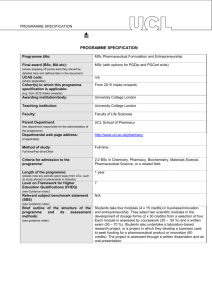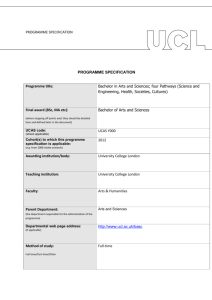PIQ (G) - University College London
advertisement
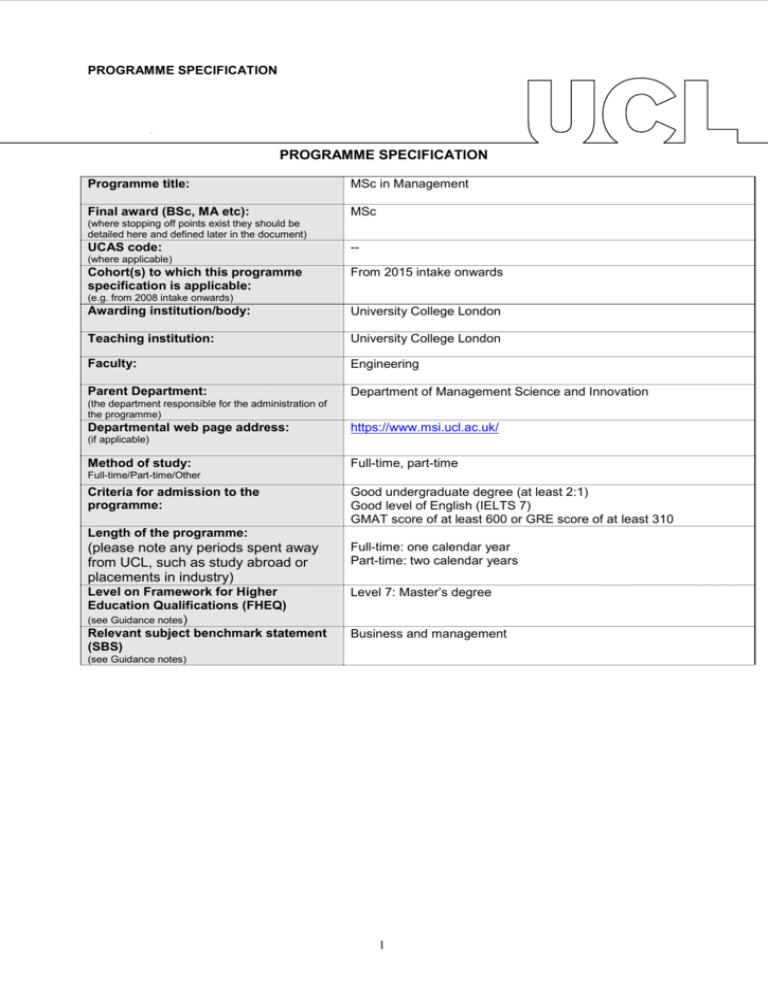
PROGRAMME SPECIFICATION PROGRAMME SPECIFICATION Programme title: MSc in Management Final award (BSc, MA etc): MSc (where stopping off points exist they should be detailed here and defined later in the document) UCAS code: -- (where applicable) Cohort(s) to which this programme specification is applicable: From 2015 intake onwards (e.g. from 2008 intake onwards) Awarding institution/body: University College London Teaching institution: University College London Faculty: Engineering Parent Department: Department of Management Science and Innovation (the department responsible for the administration of the programme) Departmental web page address: https://www.msi.ucl.ac.uk/ (if applicable) Method of study: Full-time, part-time Full-time/Part-time/Other Criteria for admission to the programme: Good undergraduate degree (at least 2:1) Good level of English (IELTS 7) GMAT score of at least 600 or GRE score of at least 310 Length of the programme: (please note any periods spent away from UCL, such as study abroad or placements in industry) Full-time: one calendar year Part-time: two calendar years Level on Framework for Higher Education Qualifications (FHEQ) (see Guidance notes) Relevant subject benchmark statement (SBS) Level 7: Master’s degree Business and management (see Guidance notes) 1 Brief outline of the structure of the programme and its assessment methods: The programme consists of : Eight taught modules assessed by coursework and/or written examination (8 x 15 credits) Research project (60 credits) - (see guidance notes) - The programme includes two routes: - Route A (for students who have not previously studied business and management) - Route B (for students who already have an undergraduate degree in business and management) Route A consists of 7 compulsory modules and 1 optional module. Route B consists of 7 compulsory modules and 1 optional module; 3 of the compulsory modules form one of 3 possible pathways: - Pathway 1: Finance - Pathway 2: Leadership - Pathway 3: Technology Management Board of Examiners: i) Name of Board of Examiners: Management Science and Innovation (MSING) Professional body accreditation (if applicable): Date of next scheduled accreditation visit: -- EDUCATIONAL AIMS OF THE PROGRAMME: The programme is designed to enhance the career prospects of recent graduates through the advanced study of business and organizations. The degree draws on the knowledge and skills gained from a first degree in a nonmanagement discipline. It envisages educating graduates who can make an early and substantial contribution to their future employer. The overall aims of the programme are to: - develop knowledge and understanding of diverse organizations and their management in the context of complexity and change - enable graduates to use analytical methods and techniques for scanning, selecting and analyzing business and management information in a creative and systematic way - develop critical appreciation of relevant theory and how it can be applied in practice to manage people, organizations and their external environments - encourage personal and professional development for lifelong learning PROGRAMME OUTCOMES: The programme provides opportunities for students to develop and demonstrate knowledge and understanding, qualities, skills and other attributes in the following areas: A: Knowledge and understanding 2 Knowledge and understanding of: (i) (ii) (iii) (iv) (v) (vi) Teaching/learning methods and strategies: markets and customers – the concepts, theoretical frameworks and their implementation for analysis and development of goods for particular markets and customers accounting and finance – the concepts, uses and management of relevant resources and information people and teams – the management and development of people and teams in organisational settings based on theories of organisational pscyhology and behaviour strategy and competition – concepts and tools for analysis and development of business and corporate level strategy in the context of competitive rivalry operations – the management of resources, projects and operations across industries ethical leadership – sensitivity and ability to develop responses to ethical issues encountered in organisations and their interactions with society - - - - - A range of methods including lectures, seminars, workshops, private reading and individual and group projects will be applied. The research project is carried out in cooperation with a company in order to base some of the learning on practical and real-life experience. The case method will be used to give students a better understanding of practice and how theory can used to examine real-life scenarios. Students are divided into study groups to encourage peer-based learning that builds on students’ current and past experiences. Each student will have a junior or mid-level mentor from the industry. Assessment: - Formative assessment via class discussion and presentations as well as mock exams and peer assessment of early assignment drafts and - Substantive assessment via a mix of coursework and examinations depending on the subject matter B: Skills and other attributes Intellectual (thinking) skills: (i) analyze, synthesize and appraise information and experiences in a creative and critical way (ii) critically evaluate arguments based on evidence, logic and values of different actors (iii) establish criteria and make use of relevant decision-making models to identify, assess and solve business problems Teaching/learning methods and strategies: - A range of methods including lectures, class exercises and verbal feedback will be used. - Most of the learning will take place via work on individual and groups assignments and projects; tutor feedback on this work will also be essential. Assessment: - Formative assessment via class and home exercises; feedback also given by tutors during class discussion and presentations - Substantive assessment via a mix of coursework and examinations depending on the subject matter 3 C: Skills and other attributes Practical skills (able to): (i) carry out research into business and management topics including the collection, analysis and presentation of data (ii) scan and organize quantitative and qualitative data for abstracting meaning in diverse organizational contexts Teaching/learning methods and strategies: - A range of methods including lectures, class exercises and verbal feedback will be used. - Most of the learning will take place via work on individual and groups assignments and projects; tutor feedback on this work will also be essential. Assessment: - Formative assessment via discussions with personal tutor and research project supervisor - Substantive assessment via coursework and research project. D: Skills and other attributes Transferable skills (able to): (i) effectively communicate complex ideas and arguments, both orally and in writing (ii) contribute to the formation and running of effective teams including the identification and management of typical problems in team development (iii) prioritize and manage time and workload (iv) identify personal learning needs for continuing professional development Teaching/learning methods and strategies: - The degree will comprise specially designed workshops on presentation, communication and time management skills. - Presentation, communications and negotiation theory is the subject matter of several modules and students will participate to exercises and presentations to develop their skills in these areas. - Two of the modules review theory of team formation and development with related case studies and exercises. Assessment: - Formative assessment via class discussion and presentations as well as in specially designed workshops on professional development - Substantive assessment via a mix of coursework and examinations depending on the subject matter The following reference points were used in designing the programme: the Framework for Higher Education Qualifications: (http://www.qaa.ac.uk/en/Publications/Documents/Framework-Higher-Education-Qualifications08.pdf); the relevant Subject Benchmark Statements: (http://www.qaa.ac.uk/assuring-standards-and-quality/the-quality-code/subject-benchmarkstatements); the programme specifications for UCL degree programmes in relevant subjects (where applicable); UCL teaching and learning policies; staff research. Please note: This specification provides a concise summary of the main features of the programme and the learning outcomes that a typical student might reasonably be expected to achieve and demonstrate if he/she takes full advantage of the learning opportunities that are provided. More detailed information on the learning outcomes, content and teaching, learning and assessment methods of each course unit/module can be found in the departmental course handbook. The accuracy of the information contained in this document is reviewed annually by UCL and may be checked by the Quality Assurance Agency. Programme Organiser(s) Marco Aponte-Moreno Name(s): Date of Production: 9 November 2009 Date of Review: September 2014 4 Date approved by Head of Department: Date approved by Chair of Departmental Teaching Committee: Date approved by Faculty Teaching Committee September 2014 October 2014 January 2015 5 6
